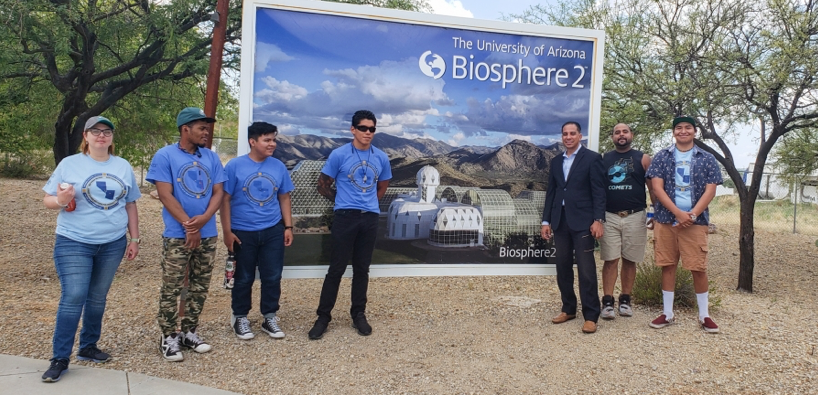
Five students in the CCC Louis Stokes Alliance for Minority Participation program took a trip recently to Biosphere 2 to learn more about research opportunities available in the Science, Technology, Engineering and Math fields. Courtesy photo.
FLAGSTAFF — A savanna. A desert. A rainforest. An ocean. All within walking distance in the same building?
Five Coconino Community College students, part of an effort to attract minority students into the Science, Technology, Engineering and Math fields, took a field trip to Biosphere 2 near Tucson this summer to get an up-close look into research being done on climate change, agriculture and more.
“It was interesting learning how people were stuck in there trying to create an environment to sustain a life on,” said student Kobe Wilson.
Wilson, who is Navajo, is enrolled in the Louis Stokes Alliance for Minority Participation (LSAMP) program at CCC. The National Science Foundation awarded the University of Nevada Las Vegas a five-year $4.6 million LSAMP grant. With the grant, UNLV, in turn, is funding a project called the Southern Nevada Northern Arizona (SNNA) LSAMP, which is an alliance of UNLV, Northern Arizona University, College of Southern Nevada and CCC. CCC’s portion of the grant will be $50,000 a year over the next five years to recruit underrepresented minority students into STEM fields.
Students receive a number of benefits, including STEM-related events and workshops, priority registration at UNLV and NAU upon transfer, mentoring by a senior student, recommendations for internships and job-shadowing opportunities. The goal is to help the students complete a STEM degree to prepare them for the well-paying STEM career field.
The Biosphere 2 trip was paid for by the LSAMP grant.
“We did it to give them a STEM experience,” said Kenisha Manley, LSAMP Coordinator at CCC. “We’re always thinking of STEM-related places for them to visit. It’s a good opportunity for students to have a hands-on experience and take a look at the research they could be participating in … and because it’s fun.”
Currently, CCC has 72 active students currently enrolled in the LSAMP program. To date, the program, which is in the third year of a five-year grant, has served 96 CCC students. So far, 17 students who were in the program at CCC have graduated or transferred to another institution.
“Ultimately, we want our students to transfer to NAU or UNLV to get a baccalaureate degree,” Manley said.
According to information from Biosphere 2, the facility “serves as a laboratory for controlled scientific studies, an area for scientific discovery and discussion, and a far-reaching provider of public education.”
Biosphere 2 was originally constructed in the 1990s to serve as a place for research to develop “self-sustaining space-colonization technology.” Scientists attempted to live in the facility as if on another planet, with no additional help from outside. Eventually, the facility was purchased by the University of Arizona to focus on research. The facility contains several controlled environments for scientists to study.
Wilson said he enjoyed the Earth Sciences and Geology aspect of the visit to Biosphere 2, and it expanded his horizons on STEM-related possibilities – although he’s currently pretty set on what he wants to do: be a physician.
Wilson gravitated toward biosciences following a football injury in high school. He enrolled in a bioscience course through the Coconino Association for Vocations, Industry and Technology (CAVIAT) program taught by CCC Science Instructors Dr. Aaron Tabor, Ph.D., and Robert Woodruff, he was hooked.
“I love that stuff,” he said. “It’s pretty fun and it sparks my interest.”
He began taking more and more CAVIAT and Dual Enrollment courses while in high school. As a result, when he begins as a CCC student in the fall, he won’t be at the college long before moving to a university.
He’s looking forward to more LSAMP activities in the future, and Manley added that more activities similar to the trip to Biosphere 2 are planned.
Dr. Gonzalo Perez, CCC’s Associate Provost, said, “We’re thrilled to be able to expose our students, with trips like this, to research areas that they may not be aware of. These experiences spark the imaginations of students, and they motivate them to consider careers in STEM.”
For more information about the LSAMP program at CCC, visit https://www.coconino.edu/lsamp
